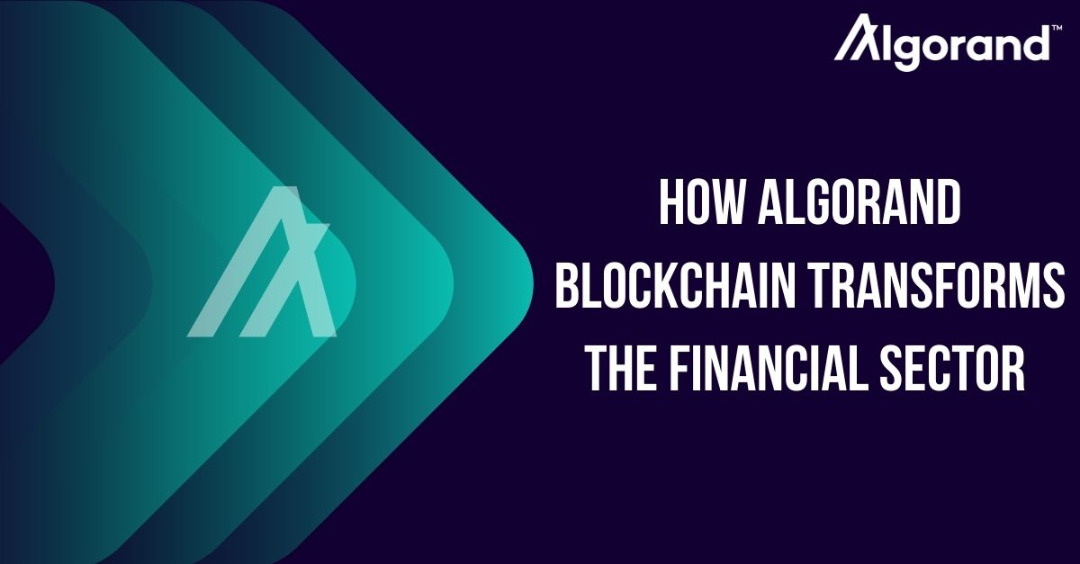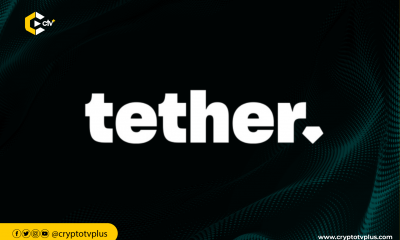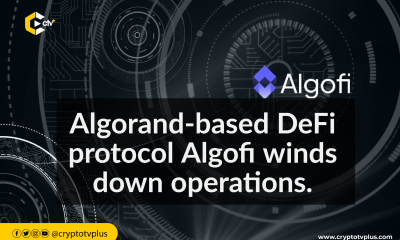Opinion
How Algorand Blockchain Transforms the Financial Sector

- Algorand intends to push out and build up the world’s first permissionless, adaptable, and pure proof-of-stake protocol
The finance sector is on a revolution and numerous financial organizations need to adjust to confront the challenges that come. Money and financial assets are presently being moved using complex frameworks that are really slow and expensive due to middleman. This has led to an increase in demand for fast and scalable ways to make transactions. Cross-border payments and acquisition of merchandise overseas are in need of scalable means of transactions.
The future of financial institutions is to accept blockchain innovation. Blockchain innovation offers a huge range of options for financial institutions. Blockchain is relevant now like never before.
With blockchain, it is easy to send and get information without the need for an outsider. Statistics show that 92% of twenty to thirty-year-olds no longer have confidence in independent financial organizations. With the excessive fees that accompany banks and financial associations, many are looking for payment systems that need no middleman. Also, many citizens in the world don’t have access to reasonable financial markets and consequently hesitate to invest in one.
This and a lot more reasons show the need for blockchain adopted financial markets. It is very possible that open-source cryptocurrency holds the key to an open, straightforward, and secure worldwide borderless economy.
Blockchain innovation is on the way to becoming the bedrock of financial applications. Notwithstanding, not all blockchains are made to be decentralized and versatile. Most first-generation blockchains can’t support complex applications that can control financial institutions that fulfill the needs of buyers.
New FinTech organizations are launching with the benefit of low overhead that they can give to their clients, changing how consumers and establishments bank, exchange, finance, and offer payments. Consumers and businesses currently have more alternatives to choose from and can anticipate quick and reliable administrations.
Introducing Algorand Blockchain
Algorand intends to push out and build up the world’s first permissionless, adaptable, and pure proof-of-stake protocol that does not fork, without yielding its core attributes as a decentralized, secure, and cost-effective blockchain.
Numerous financial transactions rely upon conventional contracts which include a lot of paperwork between both parties and the presence of a third party as a trusted figure. However, smart contracts replace this type of arrangement. Smart contacts open the way for smoother agreements and give both parties more control without a middleman.
A smart agreement is a self-executing contract written in lines of code. The code and the arrangement automatically execute when the terms predefined in the agreement are addressed and approved self-sufficiently without the requirement of a third party.
Algorand provides smart contracts that are profoundly solid, tamper-proof, secure, and decentralized, with no forking and offer quicker error-free applications. Algorand offers both stateful and stateless agreements.
Stateful smart contracts are the building blocks of distributed applications on the Algorand blockchain. They give permission to on-chain state values and can be combined with other Algorand layer-1 features to execute dynamic and remarkable applications that exploit Algorand’s versatility and performance.
See also: The Algorand Solution to DeFi (Decentralized Finance)
This opens up a tremendous range of opportunities for financial institutions to upgrade their operational effectiveness. Algorand smart contracts permit developers to use the fundamental attributes of the network. It also allows developers to access simplified tools that can build applications easily without giving up on the speed and scalability of the platform.
How Algorand Paves the Way for the Finance Sector
Cheap and Scalable Transactions
Algorand’s smart contracts eliminate the need for an intermediary. This takes out every one of the extra costs that come with hiring a third party as a validator, thus improving the speed of transactions. To this end, the receiving party has increased liquidity with no possibility of falling victim to fraud.
KYC Verification
Today, the process for KYC confirmations is costly and takes a lot of time to finish. With the assistance of Algorand smart contracts, people can now be able to possess and control their own personal data without giving out sensitive information for KYC checks. This will encourage clients to consent to KYC guidelines and allow for smooth interactions between financial establishments.
Transparency of Data
Algorand smart contracts allow financial institutions to record accurate financial data of individual transactions on the platform. Financial institutions that use smart contracts take out the requirement for any intermediary to direct business with one another. This guarantees a serious extent of transparency between the parties involved.
Algorand’s smart contracts give room for smooth exchanges between blockchains, making it possible to remove counterparties while keeping up a similar degree of insight that they can give.
Financial Data Recording
Smart contracts allow financial institutions to record accurate financial data of people making exchanges on an immutable network, guaranteeing that there is a serious extent of data integrity and transparency. Integrating smart contracts into financial activities additionally eliminates any potential middleman when parties need to approve value-based information between one another.
Risked Based Capital (RBC)
In the present unstable market, it is important that financial institutions limit asset holding risk by keeping up appropriate risked based capital levels. Risked Based Capital requirements are needed to protect financial institutions from assets performance risks such as price shocks, asset defaults, and false conduct. Risked Based Capital is really expensive. By diminishing the general danger of a transaction, the capital requirements set on the firm are reduced and by definition make any financial exchange more capital proficient and in this manner more beneficial to the institution.
The partnership of Algorand’s atomic swap functionality and immediate block finality gives a much better solution to the issue of risked based capital requirements. This creates a riskless domain shielded from fraudulent and criminal activities.
Conclusion
I believe I can say without a doubt that these amazing features are truly astonishing. This is only a brief look into the tremendous advantages the Algorand blockchain provides for the banking and finance sector.
Embracing the Algorand blockchain won’t simply decrease the pressure of banking activities yet additionally spare many financial institutions from unwanted costs. People need a smooth, quick, transparent, and versatile blockchain operation, and Alogorand blockchain is the way forward for financial institutions.
Written by Ubong Ephraim
























